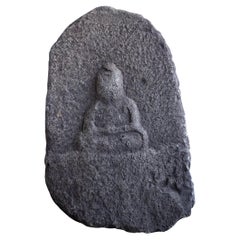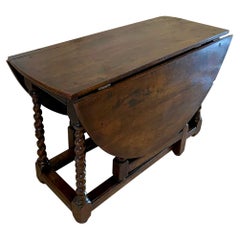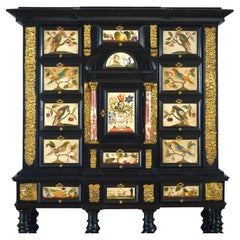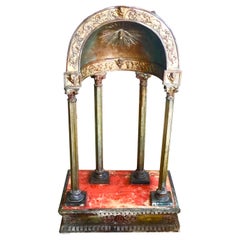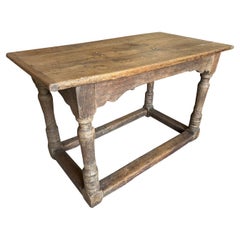17th Century Furniture
to
2,108
4,561
2,192
6,976
1,004
182
84
45
33
26
24
17
17
17
14
12
7
7
7
2
1
1
40,649
135,070
542,532
286,676
85,811
261,318
124,627
12,797
5,570
18,643
22,805
19,412
54,200
72,487
61,113
21,675
9,316
2,229
1,659
1,261
1,109
836
3,889
1,193
1,056
893
829
6,976
6,976
6,976
58
37
18
12
11
Period: 17th Century
Edo Period Stone Buddha/1600’s/Japanese Antique Buddha Statue/Garden Ornament
Located in Sammu-shi, Chiba
This stone Buddha sculpture, believed to date back to the early Edo period or earlier, depicts Jizo Bosatsu in a seated pose.
Crafted from granite, it showcases the natural effects ...
Category
Japanese Edo Antique 17th Century Furniture
Materials
Stone
Antique 17th Century Oak Gateleg Table
Located in Suffolk, GB
Antique 17th century oak gateleg table having a solid oak top with two drop leave, original iron hinges above unusual barley twist suppo...
Category
English Antique 17th Century Furniture
Materials
Oak
$2,070 Sale Price
25% Off
The Ditchley Park Cabinet
Located in London, GB
A MAGNIFICENT BRASS-MOUNTED PIETRA DURA, EBONY AND EBONISED CABINET-ON-STAND, DUTCH, CIRCA 1650-80, THE PIETRA DURA PANELS FLORENTINE, MID 17TH CENTURY.
Inset overall with paired Fl...
Category
Antique 17th Century Furniture
Materials
Alabaster, Limestone, Marble, Breccia Marble, Brass
$899,363
17th Century Tuscany Metal Wood Tabernacle in Antonio da Sangallo Style, Italy
By Antonio da Sangallo il Giovane
Located in Sofia, BG
Beautiful authentic Italian metal and wood portable tabernacle in style of Antonio da Sangallo the Younger.
A civil and military architect, Antonio da Sangallo the Younger was tr...
Category
Italian Renaissance Antique 17th Century Furniture
Materials
Metal
$1,328 Sale Price
70% Off
French Louis XIII Farm Table
Located in Round Top, TX
A very charming Louis XIII Farm Table from the South of France. Soundly constructed from beautifully patina’d oak with nicely turned legs.
Category
French Antique 17th Century Furniture
Materials
Oak
Late 17th C. Franco-Flemish Biblical Tapestry Reconciliation of Jacob and Esau
Located in New York, NY
This is a gorgeous antique Late 17th Century Franco-Flemish Biblical Tapestry depicting the Reconciliation of Jacob and Esau. The tapestry illustrates the Old Testament story of Jaco...
Category
Belgian Baroque Antique 17th Century Furniture
Materials
Tapestry, Wool, Silk
Large Antique 17th Century Brussels Religious Tapestry
By Flemish
Located in New York, NY
This is a large gorgeous Large Antique 17th Century Brussels Religious Tapestry depicting a scene with a bishop and attendants standing on the right, along with kneeling and standing...
Category
Belgian Baroque Antique 17th Century Furniture
Materials
Tapestry, Wool
Antique Bronze Burmese Buddha Statue from Burma
Located in DEVENTER, NL
Material: bronze.
Measures: 45 cm high.
28,5 cm wide - 22,5 cm deep.
With traces of original lacquer & 24 krt. gold.
Ava style.
Bhumisparsha mudra.
Originating from Burma.
Late 17th - early 18th century
Casted with a high silver aloy
A very special Buddha...
Category
Burmese Antique 17th Century Furniture
Materials
Bronze
17th Century Flemish Tapestry Panel
Located in Canterbury, GB
A Flemish Figural Tapestry Panel
Dating from late 17th century
Hand woven in naturally dyed wools and silks
Depicting a Maiden playing a musical instrument within a garden setting...
Category
Dutch Antique 17th Century Furniture
Materials
Wool
Indo-Portuguese sculpture "Lady Conception" 17th century, H 147cm
Located in Madrid, ES
Indo-Portuguese sculpture "Lady Conception" 17th century, H 147cm.
Our Lady Conception Indo-Portuguese teak wood carving from the 17th century.
Upholstered and polychrome . T
he ...
Category
Portuguese Renaissance Antique 17th Century Furniture
Materials
Wood
Mid 17th Century French Console
Located in Nashville, TN
This is an absolutely stunning mid 17th century piece! This console table wears its age magnificently with gorgeous patina and detail on every inch of the piece. This piece portrays ...
Category
French Antique 17th Century Furniture
Materials
Hardwood
Late Ming Era Documented Glazed Pottery Horse
Located in Kastrup, DK
An elegant Chinese Ming dynasty pottery figurine depicting a horse in a standing pose with polychrome finish (aubergine, light brown and g...
Category
Chinese Ming Antique 17th Century Furniture
Materials
Pottery
Antique 17th Century Baroque Italian Silk, Metallic Thread Embroidery Panel
Located in New York, NY
Fine 17th century Baroque period silk and metallic thread embroidery panel.
Excellent vibrant colors of bold burgundy, pale cream and beautiful, elegant teal with a border of textur...
Category
Italian Baroque Antique 17th Century Furniture
Materials
Metallic Thread
17th Century Italian Baroque Architectural Bases Carved Giltwood Elements Pair
Located in Milano, MI
17th Century Italian Baroque Architectural Bases Pair of Carved and Giltwood Elements featuring blue painting details, a pair of antique decorativ...
Category
European Baroque Antique 17th Century Furniture
Materials
Wood, Giltwood
17th Century Flemish Mythological Tapestry, with the Deities Apollo & Artemis
Located in New York, NY
A Flemish mythological tapestry from the 17th century, depicting the twin Greek deities, Apollo and Artemis, with Apollo, the deity of music and the...
Category
European Antique 17th Century Furniture
Materials
Wool
$23,996 Sale Price
20% Off
The Feast of Balthazar, Frans FRANKEN II and workshop, 17th c.
By Frans Francken II
Located in PARIS, FR
Large oil on oak panel (105 x 72 cm), portraying ‘The Feast of Balthazar’.
Attributed to Frans Franken II and his workshop.
The workshops of Antwerp spread throughout Europe, produci...
Category
Dutch Other Antique 17th Century Furniture
Materials
Wood
Rare Pair Wanli Miniature Chinese Blue & White Ewers ca1600 Bird & Floral Decor
Located in Amsterdam, Noord Holland
Rare Pair of Late Wanli Period Miniature Chinese Porcelain Ewers (ca. 1600–1620)
A charming and unusual pair of miniature blue and white ewers, beautifully hand-painted with bird an...
Category
Chinese Ming Antique 17th Century Furniture
Materials
Porcelain
Beautiful 17th Century French Fireplace Trammel or Hanger
Located in Amerongen, Amerongen
Beautifully decorated 17th century French Louis XIV fireplace trammel made of wrought iron.
The trammel was used for cooking to regulate the dist...
Category
French Louis XIV Antique 17th Century Furniture
Materials
Wrought Iron
Marble Stele, Christ Of The Resurrection, 16th/17th Century
Located in MARSEILLE, FR
Stele or oval block of white marble, engraved with the motif of Christ of the Resurrection.
This type of element can be seen in chapels in Italy, as ex-votos, embedded in walls ...
Category
Italian Other Antique 17th Century Furniture
Materials
Marble
Important Spanish Cabinet, 17th Century
Located in Madrid, ES
Important Spanish Cabinet 17th century
in blackened wood and tortoiseshell veneer.
It opens with eight drawers framing a central door, surrounded by two columns.
Richly decorated w...
Category
Spanish Baroque Antique 17th Century Furniture
Materials
Bronze
Renaissance Period French Hand Carved Chest / Trunk - 17th - France
Located in Beuzevillette, FR
Very beautiful trunk from the Renaissance period, very nicely carved with palm leaves and acanthus leaves in an architectural setting. Four Ionic co...
Category
French Renaissance Antique 17th Century Furniture
Materials
Wood
Flemish 17th Century Oil on Canvas Painting of the Adoration of the Magi
Located in Round Top, TX
Beautiful Flemish 17th century oil on canvas painting depicting the adoration of the magi. Vivid color and wonderful quality of pa...
Category
Dutch Antique 17th Century Furniture
Materials
Canvas
16th/17th Century Elizabethan Carved Oak Three-tier Court Cupboard Server
Located in Forney, TX
A scarce period late 16th / early 17th century with later elements Elizabethan carved oak three-tier court cupboard - sideboard server. English / Northern European; circa 1600
Hand-crafted of solid oak single board planks, heavy profusely carved bulbous turned columns, scalloped and pierced decorative elements and elaborate carvings.
Provenance / Acquisition:
Acquired from reputable auction house Bright Star Antiques, Sulfur Springs, Texas.
Very similar notable examples can be found:
Christie's; auction 14963, The Collector: English and European Furniture, Works of Art & Ceramics & Silver catalog, October 2017, lot 576, Property of the Metropolitan Museum of Art, Elizabethan three-tier oak court cupboard, circa 1600 with modifications
Philadelphia Museum of Art; Gallery 363, European Art 1500-1850, third floor, English court cupboard...
Category
European Elizabethan Antique 17th Century Furniture
Materials
Oak
IMPORTANT MUSEUM QUALITY ANTIQUE 1680 TO 1720 GERMAN SiLVER SAFE STRONGBOX
Located in West Sussex, Pulborough
Royal House Antiques
Royal House Antiques is delighted to offer for sale this important, Museum Quality German safe circa 1680-1720 attributed to Johann Gottlied Dittman and Sigmund Gatchen
Please note the delivery fee listed is just a guide, it covers within the M25 only for the UK and local Europe only for international, if you would like an accurate quote please send me your postcode and I’ll provide you with the exact price
Where to begin, if you are looking at this listing then the chances are you know something about antique safes, if you do, then you will recognise just how rare this piece is, I have in all my online research only found one other that was in a terrible condition, it sold in the Sotheby’s Carlton Towers sale on the 4th November 2009, the sale price was £73,250 plus commission which at the time was 30% making the final sale amount £95,225 This example was missing the original key, all the silver finish had polished off and it was rusty, mine by comparison is in absolutely sublime order throughout
The original key is present, it operates the exceptionally heavy top lock which has 22 separate locks, each lock works independently so if a thief tried to force one open, it would have no affect on the remaining 21 locks
The front of the safe depicts a bird possibly an eagle, the top has a medieval locking plate cover which splits down the middle to reveal the entrance to the lock, it looks similar to a fleur de lis, it springs closed when the key is removed and has its own lock, it has a secret to unlock it, if you don’t know it, you can never fit the key. The sides have oversized handles as they need to be, the safe must weight in excess of 100kgs, the rear has a similar medieval crest
The finish is sublime, truly exquisite, this is a work of art and will be the centre piece and pride of any collection, I have absolutely no desire to sell it whatsoever, if it stays in my collection forever so be it, I will never have the chance to own such a piece again and it is an absolute pleasure to see it each day
For a similar strong box signed to the interior by Dittman and Gatchen and worthy of comparison see a very fine example from The Alphonse de Rothschild Collection which was sold on the 26th of March 1973 at the De Rede sale in Monaco as lot 167. The Rothschild box...
Category
Charles II Antique 17th Century Furniture
Materials
Iron, Nickel
$132,829 Sale Price
20% Off
Pair of rare 17th century celestial and terrestrial globes, Vincenzo Coronelli
Located in Paris, FR
Pair of celestial and terrestrial table globes, wooden globe covered with engraved and enhanced paper spindles. Bronze mounts with two rings featuring a horizon table engraved with a...
Category
Italian Antique 17th Century Furniture
Materials
Wood
Early Baroque Altar Candlesticks, Florence, dated 1627
Located in Greding, DE
A pair of large altar candlesticks made of carved wood, partly with a gold patina and partly with a porphyry look, on a trefoil base with lion's paws and rocaille decoration. There a...
Category
Italian Baroque Antique 17th Century Furniture
Materials
Wood
Large Grey Murano Glass Chandelier
Located in New York, NY
A circa 1960's grey Murano chandelier with 12 lights.
Measurements:
Height: 41.5"
Diameter: 38"
Category
Italian Antique 17th Century Furniture
Materials
Murano Glass
IMPRESSIVE COUNTER Indo-Portuguese 17th Century
Located in Madrid, ES
17TH CENTURY INDO-PORTUGUESE COUNTER
17th-century Indo-Portuguese Mughal cabinet,
Teak, ebony, and ivo.....
Hinged top with 6 drawers and a central interior door. Decoration depic...
Category
Portuguese Baroque Antique 17th Century Furniture
Materials
Wood
Antique 17th Century Empire Crewel Work English Pillow - 26''x 20''
Located in Los Angeles, US
Antique 17th century crewel work English pillow. Empire style.
Category
British Baroque Antique 17th Century Furniture
Materials
Wool
Portrait of an Ottoman Elite Woman, Venetian School, 17th Century
Located in Leuven , BE
This evocative three-quarter length portrait, executed in the Venetian School during the 17th century, depicts an imagined figure of an elite Ottoman woman, rendered in rich oils on canvas. Her elaborate headdress, ornate costume, and poised bearing align with Western ideals of exoticism and nobility, shaped through Venetian eyes. The rose delicately held at her chest may serve as a symbolic identifier—an allusion to Rossa or Rosselana, the Western name for Hürrem Sultan (c.1502–1558), the influential consort and later wife of Sultan Suleiman the Magnificent...
Category
Italian Antique 17th Century Furniture
Materials
Canvas
17th century copy of "The Queen of Sheba offering gifts to Solomon"
Located in Budapest, HU
Straordinaria copia seicentesca de La regina di Saba offre doni a Salomone, (1584) dipinto Paolo Caliari detto Veronese appartenente ai Musei Reali alla Galleria Sabauda. Di notevoli...
Category
Antique 17th Century Furniture
Materials
Canvas
Antique Doll House Miniature Kangxi Period Chinese Porcelain Lidded Jar
Located in Amsterdam, Noord Holland
Sharing with you this fantastic miniature Chinese porcelain Lidded jar, made for a Dutch Doll house. Stunning and rare piece
Similar piece in the V&A museum. See images.
Country o...
Category
Chinese Qing Antique 17th Century Furniture
Materials
Porcelain
Antique 17th Century Brussels Tapestry 7'2" X 2'11"
Located in Los Angeles, US
A wall hanging tapestry, simply put, is a textile specifically designed and woven to portray an artistic scene with the intent of hanging it on a wall. Antique tapestries, those that...
Category
Unknown Other Antique 17th Century Furniture
Materials
Wool, Cotton
Antique French Fireplace Screen / Gate
Located in Haarlem, Noord-Holland
Happy to offer this very attractive and rare 17th century French firescreen or gate.
This amazingly crafted gate is in perfect condition and super...
Category
French Antique 17th Century Furniture
Materials
Iron, Wrought Iron
Spanish 17/ 18th Century Hand Carved Group of Baroque Winged Angel Heads
Located in Buisson, FR
Beautiful Hand carved group of winged angelheads. Wonderful traces of paint are visible and the wood has a gorgeous natural patina due to its high age
Spain, circa 1650-1750 Weathere...
Category
Spanish Baroque Antique 17th Century Furniture
Materials
Wood
$688 Sale Price
41% Off
Chinese Pair Kangxi Porcelain Famille Verte Buddhist Lion Joss Stick Holders
Located in Bishop's Stortford, Hertfordshire
A very fine pair antique Chinese Kangxi porcelain famille verte Buddhist Lion joss stick holders dating between 1662 and 1722. The dogs sit raised on...
Category
Chinese Qing Antique 17th Century Furniture
Materials
Porcelain
Antique 17th century Flemish solid brown oak Renaissance Carmelite cupboard
Located in Casteren, NL
On offer here is an Exquisite 17th Century Oak Two-Door Cabinet from the Carmelite Monastery in Bruges, Belgium. This antique piece, crafted in the Southern Netherlands around 1635, ...
Category
Belgian Renaissance Antique 17th Century Furniture
Materials
Steel
$7,371 Sale Price
20% Off
LATE 17th CENTURY WALNUT HALF-MOON CONSOLE TABLE
Located in Firenze, FI
Elegant hand-carved solid walnut half-moon console table. The console table features three turned legs, one at the front and two on the inside sides, which lend a touch of refinement...
Category
Italian Louis XIV Antique 17th Century Furniture
Materials
Nutwood
17th Century Italian Baroque Period Walnut Demilune Table with Carved Lyre Base
Located in Atlanta, GA
An Italian Baroque period walnut console table from the 17th century with carved lyre-shaped base. This Italian Baroque period walnut console table, dating back to the 17th century, ...
Category
Italian Baroque Antique 17th Century Furniture
Materials
Walnut
Early 18th Century Black Japanned Trinket/Jewel Box
Located in Folkestone, GB
An exceptionally rare early 17th century, James I/Charles I, black Japanned jewel box decorated with gold and red flowers and foliage. With a domed lid, o...
Category
English Elizabethan Antique 17th Century Furniture
Materials
Wood
17th Century Wine Table - 1650 -1700
Located in Santa Monica, CA
Small Wine Table
This table is made in the "inserted shoulder joint" style of construction in which the legs join the aprons with flush mitered joints. The edges of the legs and the...
Category
Chinese Antique 17th Century Furniture
Materials
Hardwood
A Ming Dynasty Patinated Bronze Relief Work Vase Turned to a Lamp
Located in New York, NY
Hailing from the Ming period in 16/17th century, this monumental bronze vase is a fine example of the auspicious decor and markings unique to Chinese furnishings. The vase is cast wi...
Category
Chinese Ming Antique 17th Century Furniture
Materials
Bronze
17th Century Brussels Mythological Tapestry
Located in New York, NY
A Brussels mythological tapestry from the first half of the 17th century, woven by Peter van den Berghen, depicting an interior scene from the st...
Category
Belgian Antique 17th Century Furniture
Materials
Wool
$54,995 Sale Price
59% Off
Ariberto Colombo attr pair of armchairs, 1960
Located in Palermo, PA
Elegant pair of armchairs attributed to Ariberto Colombo, dating from the 1960s, from Italy. These iconic pieces feature a solid wooden frame and are upholstered in a fine mustard-co...
Category
Italian Antique 17th Century Furniture
Materials
Fabric, Wood
$1,794 / set
17th Century William & Mary Walnut Chest of Drawers
Located in Hoddesdon, GB
A superb quality English William & Mary walnut and burr inlay chest of drawers, dating to the late 17th century (circa 1690s), beautifully inlaid throughout with geometric designs. T...
Category
British William and Mary Antique 17th Century Furniture
Materials
Walnut
Spanish Walnut Table, 17th Century
Located in MARSEILLE, FR
Large Spanish walnut table, 17th century, with wrought iron crosspieces.
The top is made of a single board; lag screw assembly.
17th century period table, as is: some cracks,...
Category
Spanish Louis XIII Antique 17th Century Furniture
Materials
Wrought Iron
17th Century Antique Brussels Tapestry 8'9" X 6'7"
Located in Los Angeles, US
A wall hanging tapestry, simply put, is a textile specifically designed and woven to portray an artistic scene with the intent of hanging it on a wall. Antique tapestries, those that...
Category
Unknown Other Antique 17th Century Furniture
Materials
Wool, Cotton
Vintage Regency Brass Deer - a Pair
Located in West Palm Beach, FL
A gorgeous set of vintage Regency brass deer. A beautiful set of one buck and one doe. Acquired from a Palm Beach estate
Category
Regency Antique 17th Century Furniture
Materials
Brass
Rustic French 17th Century Oak and Chestnut Trestle / Dining Table
Located in Troy, NY
Rustic, very charming trestle table, the three plank chestnut top with narrow bread board ends supported by an oak trestle base, the uneven staining on the top created by use and age...
Category
French Rustic Antique 17th Century Furniture
Materials
Chestnut, Oak
Spanish 17th Century Rustic Buffet
Located in Round Top, TX
A fantastic late 17th century Buffet from the Spanish Pyrenees region. Wonderfully constructed in richly stained oak with 2 drawers and a single door with beautifully sculpted panel...
Category
Spanish Antique 17th Century Furniture
Materials
Oak
Antique Chinese 17th C Wanli Ming Dynasty Plate Dish Porcelain Chenghua Marked
Located in Amsterdam, Noord Holland
Description
A rare Ming blue and white Porcelain dish. Great quality decoration Three Friends of Winter. Chenghua marked.
Box included.
Condit...
Category
Chinese Ming Antique 17th Century Furniture
Materials
Porcelain
$1,816 Sale Price
20% Off
Antique Ming Tianqi Chinese Porcelain Kosometsuke Plate Luohan and Marked Base
Located in Amsterdam, Noord Holland
Description
Sharing with you this Chinese porcelain deep dish from the early 17th century which measures 20.5CM in diameter.
The central image shows a Buddhist or Daoist sage (likely...
Category
Chinese Ming Antique 17th Century Furniture
Materials
Porcelain
17th Century Flemish Pillow - 20" x 10"
Located in Los Angeles, US
Good Condition, Original Design Modified.
Category
Empire Antique 17th Century Furniture
Materials
Wool, Feathers
$1,600 Sale Price
20% Off
Japanese Painting, 17th Century, Tale of Genji, Tosa School
Located in Kyoto, JP
Illustration to an unidentified chapter of the Tale of Genji (Genji Monogatari)
Tosa School (second half of the 17th Century)
Ink, pigment, gofun and...
Category
Japanese Edo Antique 17th Century Furniture
Materials
Gold Leaf
Antique 17th Century Flemish Verdure Tapestry, with Exotic Birds in a Landscape
Located in New York, NY
An antique Flemish landscape verdure tapestry from the late 17th century, envisioning two exotic birds in an idyllic woodland setting, with a stream separating the foliage in foregro...
Category
Belgian Antique 17th Century Furniture
Materials
Wool, Silk
Jan Frans van Bloemen called Orizzonte (Antwerp 1662-Rome 1749), Roman Landscape
Located in CH
Jan Frans van Bloemen called Orizzonte (Antwerp 1662-Rome 1749).
A Late 17th early 18th century Italian landscape with figures of the Roman Campagna.
...
Category
Dutch Baroque Antique 17th Century Furniture
Materials
Canvas
17th Century Spanish Walnut Cabinet
Located in Burton, TX
This 17th century Spanish Cabinet was hand carved from old growth walnut. The piece features a hand carved crown over 4 doors and two draw...
Category
Spanish Antique 17th Century Furniture
Materials
Iron
Exceptional Early 17th Century Spanish Walnut Vargueno Desk on Stand
Located in Benington, Herts
An exceptionally fine example of an early 17th Century Spanish renaissance walnut vargueno / bargueno escritorio writing desk on trestle stand.
Sp...
Category
Spanish Renaissance Antique 17th Century Furniture
Materials
Walnut
Original Antique Map of Turkey, Asia Minor and Cyprus
Located in Langweer, NL
Antique map titled 'Natoliae sive Asia Minor'. Original old map of Turkey, Asia Minor and Cyprus. Includes a decorative cartouches, sailing ship, sea mon...
Category
Antique 17th Century Furniture
Materials
Paper
$804 Sale Price
20% Off
17th Century Dutch Linen Cupboard
Located in Leamington Spa, Warwickshire
Wonderful late 17th C bleached oak Dutch linen cupboard. 1690.
Reference: 7411
Dimensions
66 inches (168 cms) Wide
20 inches (51 cms) Deep
74.5 inches (189 cms) High
Category
Dutch Antique 17th Century Furniture
Materials
Oak
Recently Viewed
View AllMore Ways To Browse
Blue And White Lidded Temple Jars
Blue Uranium Glass
Blue White Clock
Blue Yellow Pottery
Boffi Kitchen
Bombay Chest Italy
Book Table Stand
Boudoir Set
Brands Of Vintage Glass
Brass Heron Sculpture
Bread Cabinet
Bronze Lalanne
Bronze Spoons
Burl Bedside Chests
Burled Walnut Desk
Burnished Bamboo
Butter Table
Cabinet Dowel
